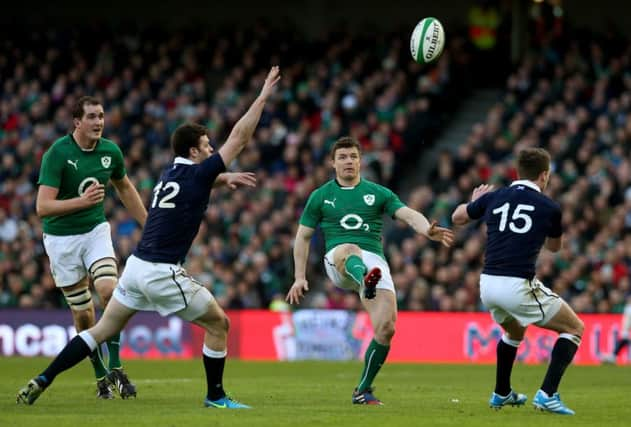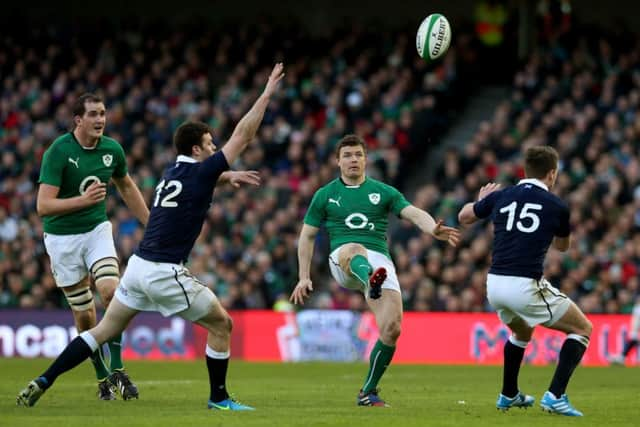Allan Massie: Scotland defeat all too familiar


Ireland, admittedly, are a good team and were always favourites to beat us. It was the manner of the defeat that was depressing because it was all so familiar.
In the first half we had lots of possession and territory. Yet we came close to scoring only once when David Denton picked up from the base of a five-metre scrum and almost forced his way over the line. He did remarkably well because the Scottish scrum was going backwards when he broke, but one can’t help reflecting that if Jamie Heaslip had picked up in similar circumstances, a couple of his team-mates would have been quick to support him and drive him across the try-line. Otherwise, we went through the motions with ball in hand, time and again. There was lots of energy and endeavour, but it was all so predictable in the face of a well organised and secure defence. Too often when we moved the ball wide, there was nobody straightening the line, nobody posing a difficult question to the defence.
Advertisement
Hide AdAdvertisement
Hide AdOne longed to see some variety, some spark of invention, some intelligent kicking too.


Stuart Hogg was the only back who occasionally threatened, one of the few players to come out of the match in credit. Denton and Alex Dunbar were two others.
Scott Johnson was originally hired as an attack coach to assist Andy Robinson. If one was to judge him on this performance, it was a waste of money. It was as if we were working on the assumption that possession would somehow or other be rewarded. But we played like a mechanical doll going through prescribed motions.
It doesn’t help, of course, if your set-piece is insecure. Two of the Irish tries were scored because we lost our own ball in defence, first at a five-metre lineout at the end of the first half, then at a five-metre scrum in the second. On that occasion Ross Ford didn’t hook, and the ball sat like a newly hatched egg in the tunnel before it was squeezed back on the Irish side. Now that referees are at least occasionally enforcing the law which requires the ball to be put into the scrum straight, hookers really must learn to hook.
Everyone else scored at least two tries on this first weekend. We scored none, and we didn’t even have a penalty shot at goal after Greig Laidlaw kicked one a few minutes into the second half to bring the score back to 6-11.
But – another old failing – we were then unable to deal with Jonny Sexton’s restart, and for the rest of the match we were on the back foot. Ireland, even without Paul O’Connell, were simply more aggressive and consistently quicker and more efficient at the breakdown – more efficient perhaps simply because they were quicker.
So where do we go from here? The pessimist might say “nowhere”, but, fortunately, form fluctuates and one poor performance doesn’t mean you can’t produce a better one in the next match. England lost, narrowly and a touch unluckily, in Paris, but they played some very good and enterprising rugby – at pace too. On the other hand, they made lots of mistakes, as indeed France did also – one reason why the match was so entertaining. We do sometimes manage to raise our game against England, at Murrayfield anyway. We’ll have to, otherwise the outlook is bleak indeed.
Scotland, one has to admit, have rarely been a free-scoring team; 1999 when we won the last Five Nations title was exceptional. In general, our victories have been won in one of two ways. Sometimes we have unsettled the opposition by playing a fast disruptive game, harum-scarum stuff, creating “organised chaos”, as we used to say in the days of Finlay Calder and John Jeffrey. More often – and more recently – wins have been secured by closing up the game and by intelligent kicking from the half-backs to pin the opposition back until they concede a kickable penalty.
Advertisement
Hide AdAdvertisement
Hide AdIn Dublin, our kicking from hand wasn’t good enough to put the Irish under pressure, and England have backs eager to run the ball when they receive poor kicks and have space ahead of them. So one would like to see us try to play a disruptive game – up and at ‘em style – anything really to stir the Murrayfield crowd.
This means surely introducing more pace into the pack, playing a genuine No 7, with Kelly Brown moved back to his natural position on the blindside, and perhaps pairing the Gray brothers at lock. I imagine Johnson will stick with Duncan Weir at No 10, but there may be a case for starting with Chris Cusiter at scrum-half to snipe around the fringes and try to unsettle Danny Care.
Presumably, Matt Scott will be judged fit enough to start at inside centre, which might give us a bit more edge in attack. What is surely certain is that we won’t beat England by playing the game in the predictable style on show in Dublin. And we won’t beat them if we can’t protect our own ball at scrum and line-out.
THE SCOTSMAN RUGBY SHOW IN ASSOCIATION WITH GINGER GROUSE
SEE ALSO: